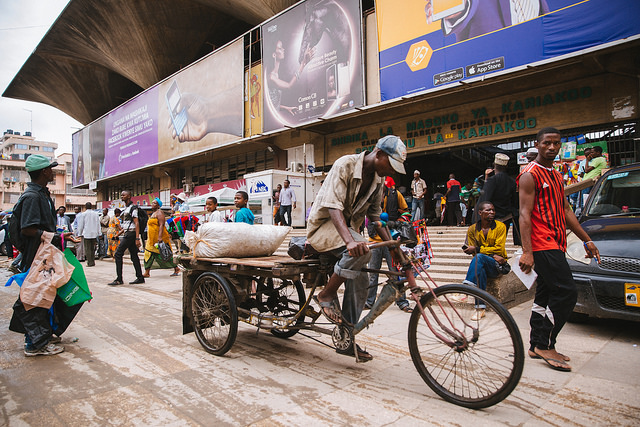By Joachim De Weerdt and Kalle Hirvonen
Migration is one of the most important changes now roiling African village life. To study that phenomenon and its impacts, we have been following a sample of 6,353 people in the remote Kagera region of Tanzania since 1991. When we last interviewed them in 2010, we found that more than half of those living had left their home villages. Migration, in fact, has been the principal pathway out of poverty: migrants economically outperformed those staying put by far, even after taking age, gender and other characteristics into account (see here, here and here). On average, they had become twice as rich as those they left behind despite starting out from very similar conditions.
But what happens to the home village once this successful group has left? Did these migrants leave and never look back, or do they now form different, or even stronger links with those remaining behind? Our new paper in the journal Economic Development and Cultural Change examines what happens to mutual risk sharing arrangements within extended families when some members migrate. We found that migrants cut back their own consumption to help needy family members in their home villages. But assistance is no longer based on reciprocity: these families do not typically help out their migrant relatives when they face hardships. In other words, the migrant provides unilateral insurance to the home community. But, given migrants also get richer, the greater risks and obligations of migration ultimately yield greater rewards.
This is a significant change. For centuries, life in African farming societies has revolved around the village, and its complex institutions of mutual assistance, in which today’s gift or favor comes with the expectation of reciprocal help tomorrow. With the whole world contained in a small number of villages clustered near one another, people know they will remain dependent on each other all their lives and cooperate accordingly.
But increasingly, with better economic opportunities elsewhere, rural dwellers in Africa are no longer physically tied to their home villages. Many leave home in search of land to farm, while a growing number turn their backs on agriculture altogether and move to cities. These economic migrants are often young and entrepreneurial—exactly the members a strong informal insurance network needs. Can traditional village life, and the institutions that shape it, survive this wave of modernization and structural transformation?
Our study found that in this region of Tanzania, migration is changing, but not destroying, the networks that sustain village life. Migrants still consistently offer assistance to their home villages, albeit under very different circumstances than before. Whether this is sustainable across future generations remains an open question.
While some will fear this new arrangement could destabilize traditional African mutual solidarity networks, others worry about the disincentive effects of such redistributive pressures: will migrants’ effort, entrepreneurship and risk-taking be discouraged when they are “taxed” by their kin? We think not. Migrants remaining in Tanzania share about 4 percent of their substantially higher incomes with relatives at home—for most, too little to constitute an significant brake on growing household wealth.
Borrowing from our data, here is the experience of a typical migrant, a 31-year-old man. In the early 1990s, he lived with his parents and siblings in a rural village in Tanzania. By 2010, he has moved 250 kilometers (150 miles) away from the village, married, and heads his own household. When his extended family back home is in need he cuts back his own consumption to assist. He receives gifts from his family members there, but these are not generally given to fill any particular economic need or help in times of trouble; they also add up to quite a bit less than what he gives to them. The inheritance of land back home plays in the back of his mind, but his main motivation for providing such unilateral insurance lies in the social norms and values that he’s been brought up with. He sometimes wonders what he could have done with all the money he sends home, but at the same time he sees that those few migrants he knows who have severed all links with home are not doing particularly well economically. More important, after all is said and done, he has become twice as rich as his twin brother who remained in the home village. It is therefore clear to him that his decision to migrate has been a very beneficial one, especially for himself and his household.
Joachim De Weerdt is Associate Professor of Development Economics at the University of Antwerp; Kalle Hirvonen is a Research Fellow at IFPRI based in Addis Ababa, Ethiopia.
The data used in this study are publicly available and downloadable here (under KHDS data).







